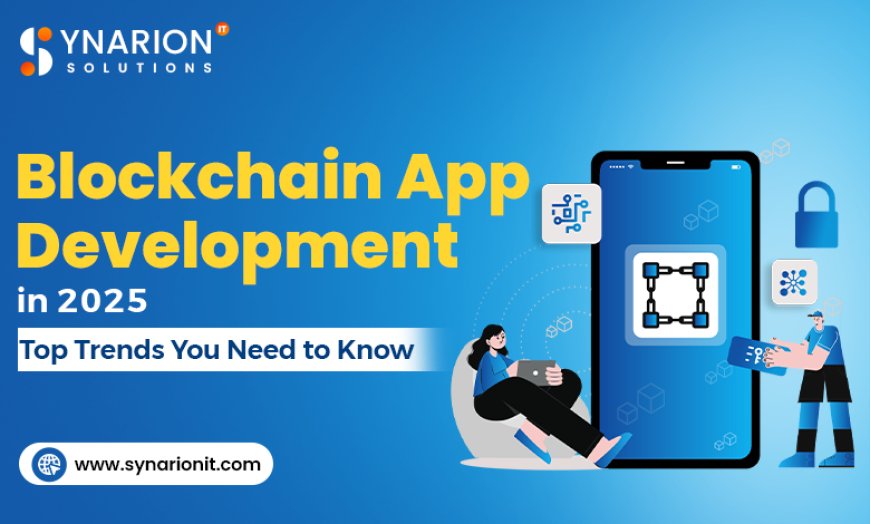Blockchain App Development in 2025: Top Trends You Need to Know

Introduction
As the digital landscape continues to evolve, blockchain technology is positioning itself at the heart of some of the most transformative industries. From finance to healthcare, supply chains to entertainment, blockchain is offering innovative solutions that empower secure, transparent, and decentralized applications. By 2025, blockchain app development is expected to advance at an even faster pace, creating new opportunities and challenges for businesses and developers alike. In this article, we’ll explore the top trends you need to know about blockchain app development in 2025 and how businesses can leverage these advancements.
Top Trends in Blockchain App Development
Wider Adoption of Decentralized Finance (DeFi)
Decentralized finance (DeFi) is one of the most promising sectors within blockchain technology, and by 2025, it’s expected to become even more mainstream. DeFi leverages blockchain to offer traditional financial services, such as lending, borrowing, trading, and insurance, without the need for central banks or intermediaries.
Blockchain app development companies are increasingly building platforms that allow users to interact with these services directly. In 2025, we can expect more complex DeFi applications to emerge, focusing on increasing security, scalability, and user experience. Developers will also enhance the interoperability between different DeFi protocols, making it easier for users to access and switch between platforms seamlessly.
Blockchain for Supply Chain Transparency
Supply chains have long been plagued by inefficiencies and a lack of transparency. Blockchain offers a promising solution by allowing real-time tracking of goods and verifying transactions between stakeholders. In 2025, blockchain app development will play a central role in enhancing the transparency and accountability of global supply chains.
Blockchain technology’s decentralized ledger enables all participants in a supply chain to access the same information, ensuring that data regarding the origin, quality, and movement of goods is accurate and tamper-proof. This level of transparency will be particularly valuable for industries like food, pharmaceuticals, and luxury goods, where authenticity and traceability are critical.
Increased Integration with Artificial Intelligence (AI)
By 2025, the integration of blockchain with artificial intelligence (AI) is expected to become more common, driving the development of smarter applications. Blockchain technology can provide AI models with a secure and decentralized environment for data storage and sharing, reducing the risks of data manipulation and bias in AI algorithms.
On the other hand, AI can enhance blockchain app development by improving transaction speed and automating key processes. AI-powered smart contracts will become more sophisticated, allowing for more complex and dynamic conditions in decentralized applications (dApps). The convergence of AI and blockchain will also pave the way for innovative solutions in industries like healthcare, finance, and energy.
Privacy-Enhancing Technologies (PETs) for Blockchain
As concerns over data privacy continue to grow, blockchain app development companies are investing heavily in privacy-enhancing technologies (PETs). By 2025, blockchain solutions will have incorporated more advanced encryption techniques, zero-knowledge proofs, and secure multi-party computation (SMPC) to ensure that users can maintain control over their personal data.
These privacy enhancements will be crucial in sectors such as healthcare, where sensitive medical information needs to be shared securely across multiple parties, and in finance, where user data must be protected from unauthorized access. Blockchain’s ability to offer transparency while ensuring privacy will be a major driver of its adoption in these industries.
Non-Fungible Tokens (NFTs) and Tokenization of Assets
While NFTs experienced a boom in 2021, their true potential is still being realized. By 2025, blockchain app development companies will explore new use cases for NFTs, moving beyond digital art and collectibles into areas like real estate, intellectual property, and even voting systems.
Tokenization is expected to revolutionize how assets are bought, sold, and managed. In particular, the ability to create fractional ownership of assets such as real estate or fine art will democratize access to investments that were previously out of reach for most individuals. Blockchain-based platforms will continue to emerge that enable seamless trading, investment, and management of tokenized assets.
Enhanced Smart Contract Functionality
Smart contracts have been a hallmark of blockchain technology, allowing parties to execute agreements without intermediaries. By 2025, blockchain app development will lead to more advanced and versatile smart contract solutions. These new contracts will be able to automate complex processes and interact with external data sources, known as oracles, to ensure that real-world conditions are met.
For example, in the insurance industry, smart contracts could automatically trigger payouts based on data feeds like weather reports or flight delays. The development of more robust and secure smart contracts will make them increasingly viable for enterprise-level applications across industries.
Cross-Chain Interoperability
The proliferation of different blockchain networks and protocols has led to a fragmentation of the blockchain ecosystem. By 2025, cross-chain interoperability will be a key focus of blockchain app development. Interoperability solutions will allow different blockchains to communicate and share data, creating a more connected and efficient ecosystem.
A Blockchain app development company will build decentralized applications (dApps) that can interact with multiple blockchains, enabling users to move assets seamlessly across different platforms. This will be crucial for the growth of decentralized finance (DeFi) and the broader adoption of blockchain technology in enterprise applications.
Blockchain for Identity Management and Authentication
Digital identity verification is becoming increasingly important in the digital age, and blockchain has the potential to revolutionize this space. In 2025, blockchain will play a significant role in secure, self-sovereign identity management, where individuals control their personal information and share it selectively.
By leveraging blockchain's immutability, developers will create decentralized identity systems that offer enhanced security and privacy for users. These systems will reduce the risks of identity theft and fraud and provide a more efficient way for individuals to verify their identity across various online platforms.
Conclusion
Blockchain technology is rapidly evolving, and its impact on industries and applications will only continue to grow through 2025. The trends highlighted above—ranging from DeFi and AI integration to enhanced privacy and cross-chain interoperability—represent the future of blockchain app development. As businesses seek to capitalize on these advancements, partnering with a skilled blockchain app development company will be crucial to ensure they stay ahead of the curve. By understanding and embracing these trends, companies can unlock new opportunities for innovation and efficiency in the blockchain-powered digital world of tomorrow.
What's Your Reaction?




















